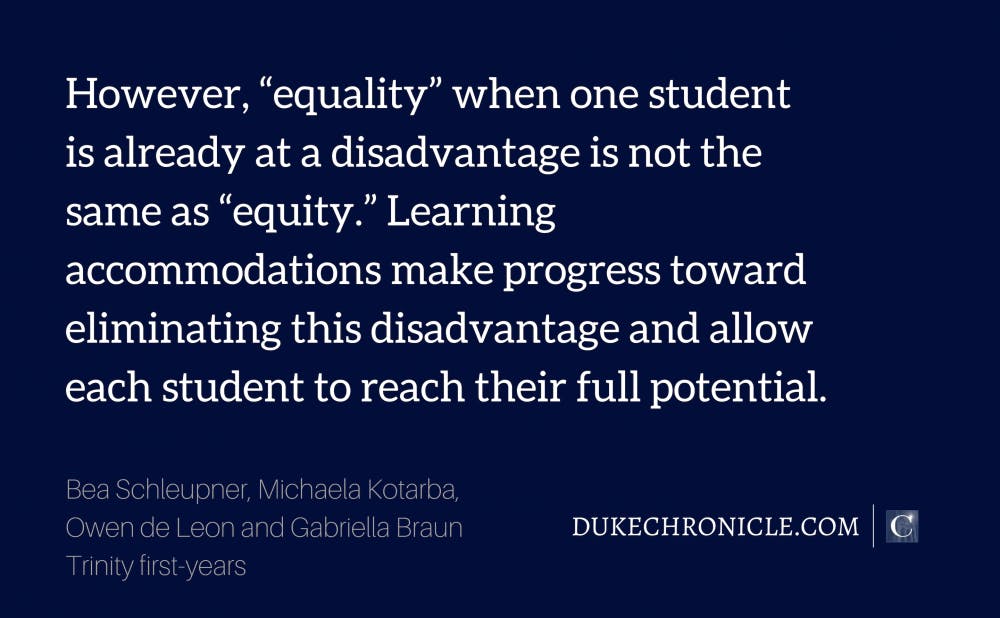- The condition, state, or quality of being free or as free as possible from all flaws or defects with minimal physical or mental exertion.
- A façade that continually plagues the campus of Duke University.
Due to the challenges of securing academic accommodations, “effortless perfection” takes more effort for students who learn differently. Students with learning disabilities have come to know this stigma all too well. Many choose to seek out accommodations for conditions such as ADHD and dyslexia, among others, with the hopes of improving their opportunities for academic success. However, the process isn’t as easy as you may assume.
Senior Adi Necalli, president of the Learning Different Club on campus, informed us of the process of getting learning accommodations at Duke. Not only does Necalli have personal experience regarding the process, but they have seen many others go through the experience as well. They stated that if a student believes they may be living with a learning disability but have not been diagnosed, they must visit the Academic Resource Center for a screening. Unfortunately, this screening often fails to address more than stereotypical symptoms such as difficulty focusing, hyperactivity and anxiety: if a student doesn’t show these symptoms, they are turned away.
If a student does qualify for learning accommodations, a long and arduous process follows this screening, including three separate tests which can last up to three hours each, weeks of reporting to the Student Disability Access Office (SDAO), and submission of extensive documentation, all of which are not covered under Duke’s health insurance program. If your learning accommodations are approved, you must email the SDAO confirming the classes you will be taking and meet in person with each of your professors every semester to discuss your learning needs.
To make matters worse, the spread of information regarding learning accommodations and disability is lacking and has not reached the majority of Duke students. In an anonymous poll we conducted of a random sample of 77 first-year students, 93.5 percent of those surveyed reported never receiving such information.
This lack of awareness extends beyond the student body. Many professors also feel uninformed about learning accommodations. For example, Edward Timke, a recently hired professor in the cultural anthropology department at Duke, explained his faculty orientation “did not involve any discussions of accommodations.” This contrasts with his previous experience in institutions like U.C. Berkeley. At Berkeley, Timke said, there is a “pro-active informational campaign via email each semester to provide information and resources to help students with accommodations needs.” Additionally, Berkeley is home to the Haas Institute for a Fair and Inclusive Society, and the university has one of the leading academic programs in disability studies in the country.
Ignorance among faculty and students leads to misunderstanding the validity of learning needs. “Most teachers don’t realize how their teaching lands on students,” Necalli said about the lack of awareness faculty have of different learning abilities. “The first semester that I ever had full accommodations, the statistics professor was adamant on not understanding why I needed them…[saying], why do you need that?’” Some students also failed to acknowledge learning differences among their peers, as almost one in five students polled agreed with the statement that accommodations, such as receiving time and a half on tests, are “unfair.”
Their objections may stem from a desire for “equality” and a belief that everyone should have the same academic resources. However, “equality” when one student is already at a disadvantage is not the same as “equity.” Learning accommodations make progress toward eliminating this disadvantage and allow each student to reach their full potential. Duke Law student Andrew Toig, who has a long history of fighting Duke’s current policies on accommodations and is chair of Law Students for Accessibility, said, “Professors are academics… most of them aren’t aware that these resources exist.” This shared skepticism ultimately stems from a lack of understanding about learning disabilities which runs deep in Duke’s culture.
What can Duke, as an institution, do to improve the process of obtaining learning accommodations? The first step is acknowledging the problem. The university has both the responsibility and means to better distribute information and training to students and faculty. Timke suggested something as simple as an informational email each semester. Another option could be annual, mandatory faculty training(s) to give professors a basic understanding of learning differences among students, as well as ways to better accommodate a wider range of students. Toig believes that with this type of faculty training, “a tremendous amount could be done in half a day.”
Duke has the ability to take a leadership role in providing accessible learning environments to students, which would make great strides towards the inclusivity that Duke hopes to achieve. As Toig said, “It’s Duke. We have some of the smartest people in the world here, and as far as I'm concerned, we have unlimited resources. It could really be a leader rather than a follower.” Duke has a history of setting precedent in many other disciplines, such as cutting-edge technologies and learning opportunities, and has the ability to be a leader in changing the culture surrounding learning accommodations across the country.
For faculty looking to better accommodate students in the classroom, there’s no need to wait. Resources are already available. If you think you may have a learning disability or another circumstance which necessitates accommodations, talk with your academic advisor and reach out to the Academic Resource Center. Students who are in Learning Different or involved with the Duke Disability Alliance can be a source of social support. Duke students aren’t perfect, but we’re all here for a reason. Don’t be afraid to ask for help.
Bea Schleupner, Michaela Kotarba, Owen de Leon and Gabriella Braun are Trinity first-years. This column was written as part of a Writing 101 class.
Get The Chronicle straight to your inbox
Signup for our weekly newsletter. Cancel at any time.

